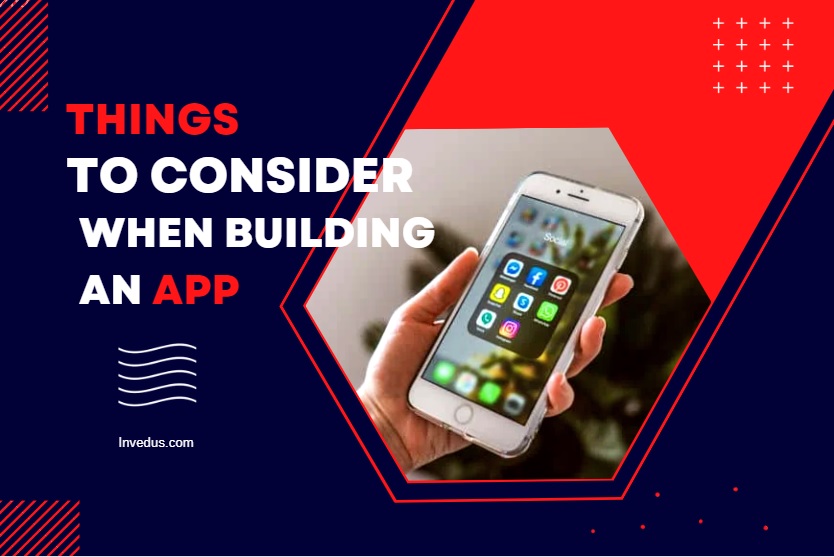
13 Things to Consider When Building an App
Fancy creating an app but feeling a bit lost in the sauce about where to start? Well, you’ve hit the jackpot by landing here. In this blog, we’re going to unravel the mystery of app creation from the spark of an idea to keeping your users hooked well after your app’s big debut.
We’re embarking on a journey together, walking you through each step needed to breathe life into a mobile app that isn’t just well-thought-out and well-built, but also well-designed – basically, an app that your future self will thank you for, and your users will adore.
So, buckle up! Whether you’re scribbling down ideas on a napkin or you’ve already got a concept that’s burning a hole in your pocket, we’ve got you covered. Let’s dive into the nitty-gritty of transforming your brainwave into a digital masterpiece that keeps your users coming back for more.
Things to Consider When Building an App

Alright, let’s dive straight into it, shall we? Deciding to build an app is a big step, but before you leap into the development process, there’s a bit of homework to do. Let’s visit, things to consider when building an app.
1. Know your competitors
First off, who are you up against? It’s crucial to understand who your competitors are and what they’ve cooked up. There’s a lot you can learn from them – what works, what doesn’t, and what users are saying. Remember, in the world of apps, the customer isn’t just always right; they’re royalty. Paying attention to app reviews can give you invaluable insights, so don’t skip this step.
2. Recognize your value-add
Now, why would someone need your app? With over 3.48 million apps in the Google Play Store as of the first quarter of 2021, your app needs to offer something unique.
If you’re still weighing the decision to build one, it helps to understand the core benefits of a mobile app, especially how it can directly support your business goals and user experience.
It’s all well and good having a shiny new app, but if it doesn’t offer anything new or solve a problem better than your web app, then why bother? Make sure your mobile app brings something unique to the table.
3. Pick a mobile responsive or mobile app
Considering the fact that mobile devices account for approximately half of web traffic worldwide, deciding between a mobile-responsive website or a dedicated app is key.
Choosing between a mobile-responsive design or a dedicated app depends on how you see your customers interacting with your service. Do you want them hooked and visiting daily? Then think about how you’ll use push notifications to keep them engaged.
4. Make your apps play friendly
Your mobile app should feel like a natural extension of your web app. If users are finding it hard to switch between the two, then something’s not quite right. They should complement each other seamlessly.
5. App security
Security is not something you can afford to take lightly. With mobile app downloads expected to skyrocket, protecting your users’ data is paramount. With mobile app downloads reaching 218 billion in 2020, security is non-negotiable. You wouldn’t want your app to be the weak link that puts their information at risk, would you?
6. Coding
The demand for mobile app development skills has skyrocketed, with the U.S. Bureau of Labor Statistics projecting a 22% growth in software development jobs from 2019 to 2029.
Coding might seem daunting, but it’s a crucial skill in the app development world. Not everyone is a born coder, but with the right learning path, anyone can get there. Alternatively, hiring a skilled mobile app developer might be the way to go.
7. App designing
Design is as important as functionality. An app that’s a nightmare to navigate is destined for the digital bin. Keep it simple, intuitive, and clutter-free. First impressions matter, especially in the crowded app markets.
8. Know about the supported platforms
Speaking of which, you’ve got to decide whether you’re playing in the Android or iOS playground – or both. While Android boasts a larger user base, don’t overlook the loyal iOS crowd. Your app needs to shine on whichever platform you choose.
9. Be Future Proof
Future-proofing your app is about looking beyond the here and now. What will the app landscape look like in a few years? Planning for future trends and technologies will keep your app relevant and competitive.
10. Payments
With mobile commerce sales expected to hit $3.56 trillion in 2021, a frictionless payment system is essential for monetizing your app effectively.
If your app involves transactions, integrating a seamless payment system from the start is non-negotiable. It should be easy, secure, and hassle-free. Get an online payment gateway for mobile that users can complete payments through seamlessly.
11. Research
Did you know the average smartphone owner uses 10 apps per day and 30 apps each month? Identifying where your app fits into users’ daily routines is crucial.
Research and analysis might sound like a drag, but they’re your best tools for standing out. Know what makes your app different and better. Ignorance isn’t bliss in app development; it’s a missed opportunity.
12. Workflow
Think about the workflow of your app. It needs to have a clear purpose and solve a real problem, or users will simply pass it by. And if it’s too complicated or lacks essential features, it won’t find a place on anyone’s device.
13. Color theme
Even the color theme of your app can play a significant role in its success. Choose a palette that reflects your brand and resonates with your target audience.
Read also – Build a mobile app development team structure
Conclusion
Staying ahead in the competitive app market requires more than just a good idea. It demands research, planning, and a keen eye for what your users really need.
Hiring a professional app developer isn’t just a step towards building your app; it’s a leap towards ensuring its success. So, are you ready to take that leap? Contact Invedus Today!





Last updated on: Nov 7, 2025